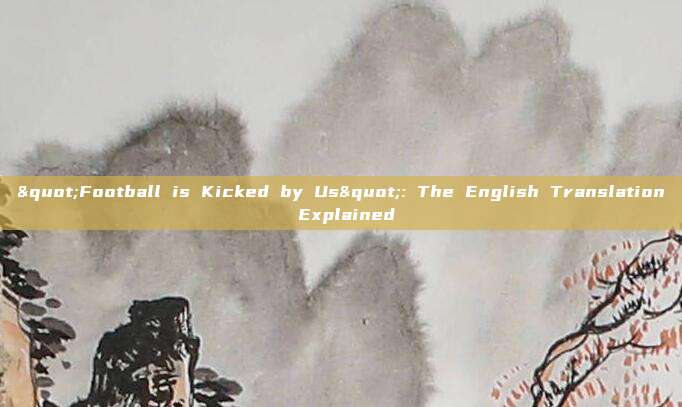**"Football is Kicked by Us": The English Translation Explained**

*By an Experienced Journalist*
In the vast and vibrant world of sports, few games can claim the global reach and fervent passion that football—known to many as soccer—commands. From the lush fields of Europe to the sun-baked pitches of South America, from the crowded streets of Asia to the dusty playgrounds of Africa, football has woven itself into the fabric of countless cultures. Yet, amidst this universal love for the beautiful game, language often serves as a bridge, connecting fans and players across borders. One such instance, which has sparked both curiosity and amusement among English speakers, is the phrase "Football is kicked by us." This article delves into the origins and nuances of this peculiar translation, exploring its cultural significance and linguistic journey.
## **The Origins: A Cultural Quirk or Linguistic Misstep?**
To understand the roots of "Football is kicked by us," we must first explore the context in which it emerged. While the exact source remains elusive, it's likely that the phrase originated from a non-native English speaker attempting to translate a simple statement about playing football into English. In many languages, the passive voice is used differently than in English, leading to literal translations that can sound awkward or humorous to native English speakers. The phrase "Football is kicked by us" is a prime example of this linguistic quirk.
### **A Tale of Two Languages**
Let's break down the phrase:
- **Football:** Universally understood, this term refers to the sport played with a round ball using feet.
- **Is kicked:** Indicates the action being performed on the subject (football).
- **By us:** Specifies who is performing the action.
In English, we would typically say, "We kick the football." However, the passive construction "Football is kicked by us" flips the script, placing emphasis on the object (the football) rather than the subject (us). This structure is more common in languages like Spanish, where the passive voice is used more frequently and can be translated more directly into English, leading to unusual phrasing.
## **The Linguistic Journey: From Foreign Fields to Memes and Beyond**
### **From Grassroots to Global Phenomenon**
What began as a simple miscommunication soon took on a life of its own, spreading through social media and online forums. Football fans and linguists alike began to dissect and discuss the phrase, leading to a fascinating exploration of language and culture. It wasn't long before "Football is kicked by us" became a meme, shared and celebrated by enthusiasts around the world.

### **Beyond the Joke: A Celebration of Diversity**
While the initial reaction to the phrase might have been one of amusement, it quickly evolved into something more profound. The phrase became a symbol of the diverse ways in which people engage with the sport they love. It highlighted the importance of embracing different linguistic backgrounds and cultural expressions within the global football community.
### **The Power of Language in Sport**
Language plays a crucial role in shaping our understanding and appreciation of sports. From the passionate chants of supporters to the strategic instructions of coaches, words are the glue that binds fans and athletes together. "Football is kicked by us" serves as a reminder of the beauty in linguistic diversity, encouraging us to celebrate the unique voices that contribute to the rich tapestry of football.
## **The Impact on Football Culture**
### **Breaking Down Barriers**
The phrase has helped to break down barriers between fans and players of different nationalities, fostering a sense of unity and camaraderie. It has shown that, despite linguistic differences, the love for the game transcends all boundaries.

### **Empowering Non-Native Speakers**
For non-native English speakers, "Football is kicked by us" has become a source of pride and empowerment. It has encouraged them to participate more actively in the global conversation surrounding football, contributing their perspectives and experiences to the collective narrative.
### **Fostering Inclusivity**
The phrase has also highlighted the need for inclusivity in sports. By celebrating the linguistic diversity within the football community, it encourages organizations and fans alike to create more inclusive environments where everyone feels welcome and valued.
## **Conclusion: A Beautiful Game, Beautifully Expressed**
In the end, "Football is kicked by us" is more than just a quirky translation. It is a testament to the power of language to bring people together, celebrating the unique ways in which we express our love for the beautiful game. As football continues to grow and evolve, so too will the stories and phrases that define it. Whether you're a seasoned player, a die-hard fan, or simply someone who appreciates the beauty of language, there's always something new to discover in the world of football.
---
This exploration of "Football is kicked by us" reveals not only the linguistic quirks that make our world so fascinating but also the deep connections that sports, and particularly football, can forge between people from all walks of life. In a world often divided by language and culture, the beautiful game continues to unite us, reminding us that no matter how we express it, football truly belongs to all of us.





